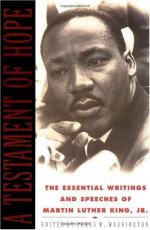
|
| Name: _________________________ | Period: ___________________ |
This test consists of 5 multiple choice questions, 5 short answer questions, and 10 short essay questions.
Multiple Choice Questions
1. What is NOT one of the ways in which oppression is responded to, according to Dr. King?
(a) Nonviolences.
(b) Physical violence.
(c) Surrender.
(d) Prayer sessions.
2. Governor George ____________ declared his stubborn resistance to the desegregation and the March to Washington DC.
(a) Evers.
(b) Smith.
(c) Thurmond.
(d) Wallace.
3. Who receives parity, subsides and incentives when they are in the world, according to Dr. King?
(a) The children.
(b) The poor.
(c) The wealthy.
(d) The middle class.
4. Dr. King believed that if the president had strong enough ___________ courage that problems could be solved.
(a) Moral.
(b) Ethical.
(c) Racial.
(d) Political.
5. There was an obligation to ensure that all __________________ participated in the enforcement and creative innovations freeing all citizens.
(a) People.
(b) Federal agencies.
(c) Whites.
(d) Women.
Short Answer Questions
1. Token _________ are not satisfactory ends, according to Dr. King and to his writing and his speeches.
2. Dr. King proclaimed that the group of students in front of him would become known as the generation of ___________.
3. In the battle for freedom and for justice, Dr. King reminds followers to be ____________ and disciplined.
4. The plans for the future, said Dr. King, involve the removal of blockage, not pouring _________ over the troubled waters in order to calm them.
5. The administration seemed unaware of the split in the leadership of the _____________ at the time.
Short Essay Questions
1. What does Dr. Martin Luther King Jr. want to stress that nonviolence is NOT for?
2. What was the plan for the march from Selma to Montgomery in terms of how long it would last?
3. What were the four main forces which enabled the problems of partial integration to be overcome?
4. Where were some of the problems that people in the ghetto were facing on a near daily basis?
5. What did the men in the Freedom March do as a result of their commitment to be nonviolent?
6. What did Dr. King see in India, even with the extreme poverty in the area as he witnessed for himself?
7. What did Dr. King tell men and women to do when it came to the rights of the African Americans?
8. What did the increased economic status of the African American now allow them to do?
9. As a result of the protests the students witnessed, what did they gain in relation to their fears about the Civil Rights movement?
10. What did the finding of a personal God help Dr. King to do during his years fighting for Civil Rights?
|
This section contains 613 words (approx. 3 pages at 300 words per page) |

|




